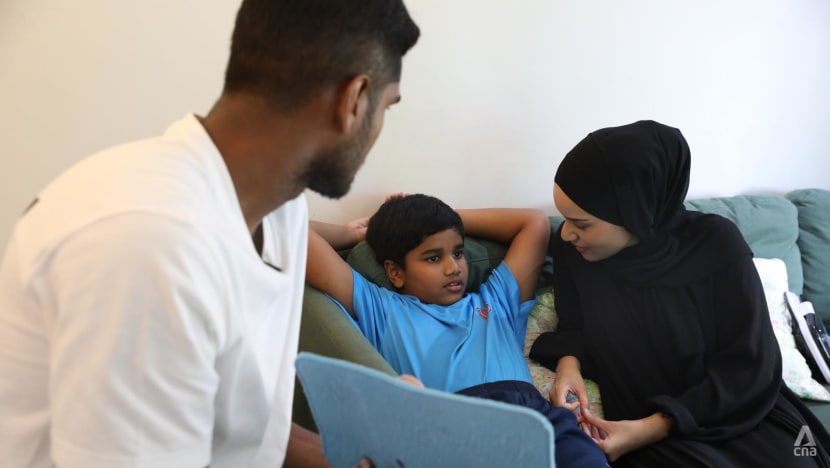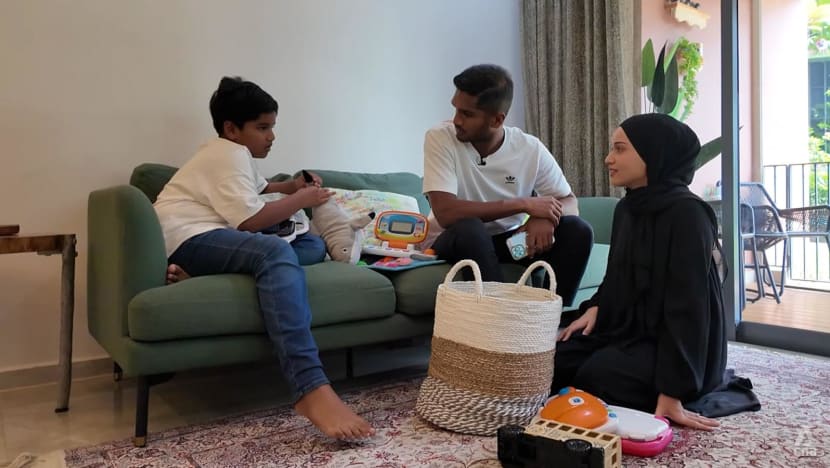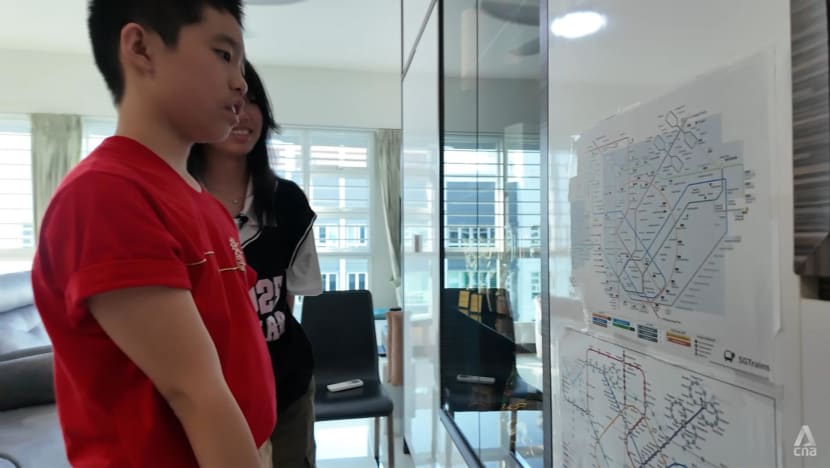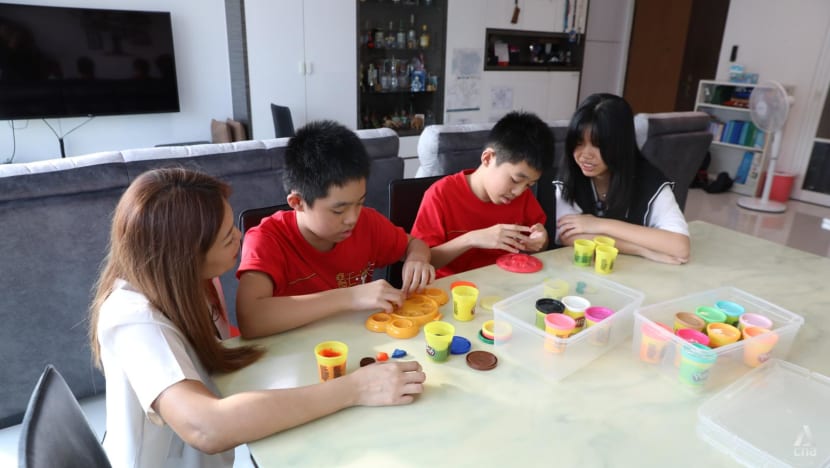'We get stares ... people say bad things': These parents just want their kids with autism to be included
SINGAPORE: It was a Friday four years ago, and Singapore's national football team captain Hariss Harun and his son were seated in the middle of a crowded mosque.
The father sensed that Naufal Hariss was getting restless, and handed him his phone to watch videos on mute. But Naufal, who was diagnosed with moderate autism at age seven, turned the volume up enough to disturb others.
Shortly after, a fellow worshipper approached Mr Hariss and angrily asked why his son was playing with a phone in a mosque.
“He just kept going on and on. I felt so down. I didn’t feel defensive, I just felt helpless," the footballer, 34, told CNA.
“As a Muslim, it’s important that I expose my kids to the faith from a young age. Although things didn’t go as planned, it’s important that we don’t give up."
Now 11 years old, Naufal typically struggles to get through other events like football matches, birthday parties and wedding dinners, which can leave him overwhelmed and overstimulated.
It can lead to situations such as a meltdown in public - which, in turn, can be daunting and overwhelming for parents, said Mr Hariss.
“The fact that autism is an invisible disability makes it harder to go out there and explain the same thing every single time. It gets a bit exhausting after a while," his wife, 33-year-old Syahirah Mohamad, added.
During the interview, both parents would pause mid-sentence now and then, to remind Naufal to take deep breaths to calm down.
These techniques, coupled with years of early intervention, have helped the boy feel more comfortable in social settings.
Yet some difficulties remain.

In February, Mr Hariss was keeping a watchful eye from his ground floor condominium unit, as Naufal and his nine-year-old sister played at the poolside.
Then, Naufal started spouting water out of his mouth and into the pool.
He was soon confronted by a resident who held onto him and scolded him with a pointed finger. Naufal's sister tried to apologise and explain, but the woman would not be mollified.
Mr Hariss "felt all sorts of emotions” as he saw his daughter walk back in tears. He spoke with the resident, telling her that Naufal had special needs.
“But she said that he shouldn’t be doing that (and) it does not matter," said Mr Hariss,
“Naufal doesn’t understand that some of the things he does are not appropriate," said Ms Syahirah, a real estate agent.
“When he’s younger, it’s still okay and acceptable. But as he grows older, all these things that he does become less tolerable because it’s odd to see a grown adult doing these things."
The pool incident, which Mr Hariss later recalled in a widely circulated video, was just one of “countless” similar episodes, his wife said.
MANAGING MELTDOWNS
According to a report released by the Ministry of Social and Family Development (MSF) in December, people with autism saw the largest decrease in positive perception towards them, falling from 69.9 per cent in 2019 to 56.2 per cent in 2023.
Those who felt negatively about people with autism also shot up from 3.8 per cent to 9 per cent during the same period.
Though Mr Hariss and Ms Syahirah know the responsibility lies on them as parents to educate Naufal, they both feel members of the public also have a key role in helping those with special needs feel accepted.
“People will tell us ‘you should watch your child’. But for as long as we watch him and don’t allow him to do things, he’s not going to learn," said Ms Syahirah. “How is he going to grow up into a capable adult?"
“We need to expose him to all these things so he can grow into an independent adult," she added. “They are allowed to take up space and I’m not going to be sorry for that."
Ms Syahirah urged the public to “just stop and smile instead of making it look like something terrible is happening".
“Maybe when you see a child having a meltdown in public, just stop and think that the parents are trying their best and maybe the child has special needs."

Ms Keenbie Kok, a mother to 13-year-old twins with autism, is on a similar mission to teach her kids the right behaviour while seeking public understanding.
She goes on weekly train rides with her boys to help them feel more included in society, and to teach them independence.
Younger son Vernon Chua is a huge MRT enthusiast who's memorised all the station names and station codes in order.
“Jurong East. NS1. EW24,” he proudly said as his 14-year-old sister tested him with a physical map pasted on the wall.
“We will go all over Singapore without any plan. But I’ll ask him what route he wants to cover and the interchanges he wants to visit,” Ms Kok said. “He has a fascination with completing all the different lines.”
On one weekend last month, however, an otherwise routine ride on the Circle Line ended in screams and tears.

In a particularly packed train that day, Ms Kok’s kids began to feel overstimulated from the noise, and older son Victor Chua started touching the man in front of him.
“I told him to stop doing that in a very firm voice. He began to scream in the train and everybody started looking at us,” she said. “It’s not the first time this has happened.”
Victor, who has minimal verbal communication, tends to scream whenever he needs help or feels overwhelmed.
Ms Kok immediately alighted at the next stop, left the station and brought her sons to a quiet public housing void deck.
“He was still very unhappy and continued to scream. It took about 40 minutes just to calm him down, and we had to take a cab home,” she said, adding that such situations are harder to manage when the twins have simultaneous meltdowns.
“They don’t understand social space, and will touch people and get misunderstood. Or if they do something inappropriate in public, it may cause misperceptions and cause danger.”

As the boys hit puberty, they've also become “curious" about their private parts, inadvertently causing concern and misunderstanding in public, said their mother.
“We always get judgemental stares and I sometimes hear people say bad things about them. So it’s very difficult."
According to Dr Sim Zi Lin, psychologist and programme director at Autism Resource Centre Singapore, teenagers on the spectrum would have difficulty understanding the changes happening to them during puberty.
While this is the age where most teenagers lean on their peers for support, this is yet another challenge for those with autism due to social communication and interaction barriers.
"This may be the time when they have difficulties fitting in as people might ostracise them and they may face more bullying."
A NEED FOR EMPATHY
Experts told CNA that while general awareness of autism might have increased, understanding and acceptance of the condition remain a challenge.
“Autism is just a different way of being different. It doesn’t make them any less than us. So it really shouldn’t be about tolerating their presence, but treating them with the same respect," said Dr Sim, adding that society still has ways to go in achieving this.
“Having socialisation opportunities and encouraging people to be more open to befriending people on the spectrum will decrease these negative attitudes and increase the positive perceptions towards autism."
Bernard Chew, chief executive officer of St. Andrew's Autism Centre, said: “In an ideal world, every member of the public will have sufficiently deep knowledge about the challenges of living with autism that when they see such atypical behaviour, they can first understand and empathise with what has happened.
“The response of empathy and understanding, rather than judgement, will help make public spaces much more welcoming for persons with autism and their caregivers," he added.

Ms Kok acknowledged that over the years, she has become braver in standing up for her sons, and also noticed a slow shift in public perceptions of people on the spectrum.
She recalled an incident where the twins were making “weird” noises while waiting for a bus. This bothered an elderly lady, who muttered under her breath that the children were causing a ruckus.
“In the past, I would not open my mouth. But I realised she does not know their condition. And when I told her, she said ‘they look so normal'.
“I started to educate her on autism and her whole perception changed. She even started talking to my boys,” said Ms Kok.
If the public can give people with special needs a chance to be more included and more integrated in society, her sons will have a better shot at living independently when they grow up, she said.
Mr Hariss and Ms Syahirah, too, are working on preparing Naufal to be able to depend on himself when the day comes.
With over 88,000 followers on the football star's Instagram page, the couple have also spotted an opportunity to generate more awareness and educate the public on better interacting with people with special needs.
Mr Hariss has become more vocal about the issue in recent times, and this week he started a campaign aiming to raise S$150,000 (US$112,000) for the Association for Persons with Special Needs, where Naufal is a student.
“These things that happen to us are not pleasant and we don’t feel good sometimes, but I think it gives us a chance to learn at the same time, and gives us a chance to share these stories with people out there,” Mr Hariss said.
“When Naufal came along, he taught us to grow up as parents. We’re still learning every day."
That includes celebrating the small wins. From being unable to sit through a football match, his son can now watch closely along with the rest of the family as Mr Hariss bosses the pitch – and even wave back eagerly when dad looks to him in the stands.
Disclaimer: Investing carries risk. This is not financial advice. The above content should not be regarded as an offer, recommendation, or solicitation on acquiring or disposing of any financial products, any associated discussions, comments, or posts by author or other users should not be considered as such either. It is solely for general information purpose only, which does not consider your own investment objectives, financial situations or needs. TTM assumes no responsibility or warranty for the accuracy and completeness of the information, investors should do their own research and may seek professional advice before investing.
Most Discussed
- 1
- 2
- 3
- 4
- 5
- 6
- 7
- 8
- 9
- 10